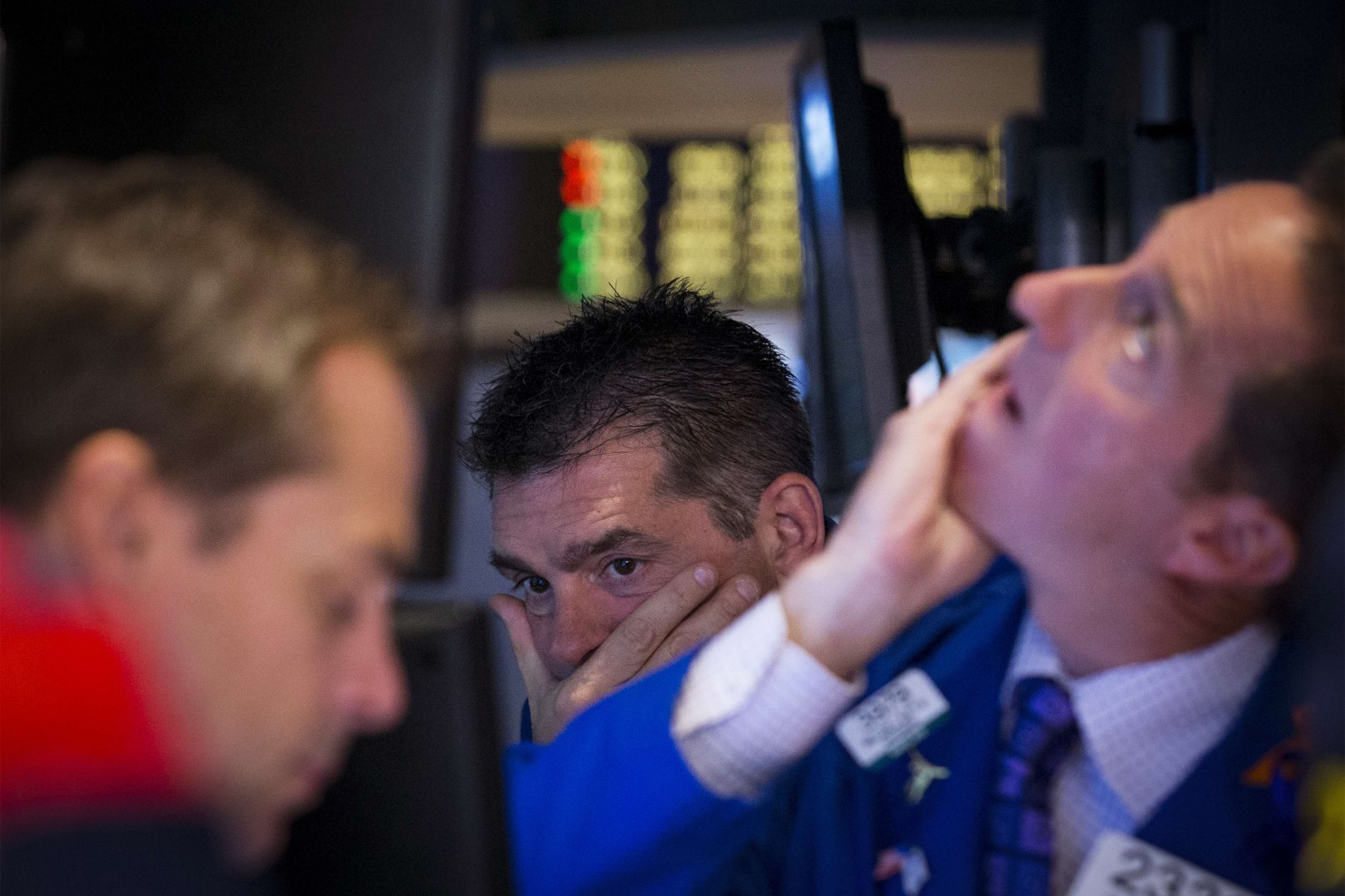
Opinions
IBM’s big blues
|

Traders work on the floor of the New York Stock Exchange October
20, 2014. U.S. stocks were mixed on Monday, as the S&P 500 and
Nasdaq advanced, but the Dow fell as quarterly results from IBM
disappointed. REUTERS/Brendan McDermid (UNITED STATES - Tags:
BUSINESS TPX IMAGES OF THE DAY) (Brendan Mcdermid/Reuters)
|
Big Blue’s got the blues. On Monday, IBM’s
stock tumbled by 7
percent after it unveiled a dismal quarterly earnings
report that showed a 4 percent drop in revenue — the
10th consecutive
quarter of flat or declining sales. Revealing these mournful numbers,
the company also announced it would abandon a policy that set it apart
from all other firms:
the 2010 pledge
from then-CEO Sam Palmisano to raise the earnings per share of its
stock to $20 by 2015.
No other company had so explicitly promised to raise the shareholders’
return on their stock. Maximizing shareholder value has been the North
Star of U.S. corporate policy for decades now, but no other firm
pursued it so openly — and disastrously — as IBM.
Harold Meyerson writes a weekly political column that appears on
Thursdays and contributes to the PostPartisan blog.
View
Archive
|
|
There are two ways to increase a company’s earnings per share: Either
you increase the earnings, or you reduce the number of shares.
Unfortunately for IBM, it had trouble keeping up with the rapid pace
of change in the high-tech world. Its earnings flat-lined. To meet
Palmisano’s pledge, the company embarked on an orgy of buying back its
stock. This had already been an unstated policy at IBM; Palmisano
merely made it more explicit. Since 2000, IBM has
spent a
mind-boggling $108 billion — $12 billion of that in the
first half of this year — buying back shares. It devoted another
$30 billion to paying dividends. The Financial Times calculated that
from 2003 to 2013, the company devoted nearly 80 percent of its cash
to rewarding shareholders through buybacks and dividends.
In 1993, IBM had 2.3 billion outstanding shares; 20 years later, it
had 1.1 billion. As the
Wall Street
Journal’s Dennis Berman has pointed out, at that pace the
company would have no publicly traded shares at all by 2034.
The rise in earnings per share at IBM entranced big-time investors. No
Carl Icahns barraged its managers with complaints that it wasn’t
returning enough to shareholders (a complaint Icahn has repeatedly
lodged against Apple and other companies more successful than IBM).
Palmisano’s pledge, and the company’s history of buying back its
shares, even persuaded Warren Buffett, who had previously shied away
from investing in tech companies in a nod to the sector’s penchant for
creative destruction, to become IBM’s biggest single shareholder.
IBM’s appeal,
Buffett explained
to CNBC, was clear: “They have this terrific reverence for the
shareholder.” Indeed, so great was this reverence that IBM even
incurred major debt to finance its repurchases.
|
|
|
IBM's quarterly profit plummeted more than 99 percent. Its CEO
said IBM was "disappointed in our performance." (Reuters)
|
Over the past year, however, some analysts began arguing that
increasing earnings per share by decreasing the number of shares
wasn’t really much of a strategy. David Stockman (once Ronald Reagan’s
budget director) called the company
“a buyback machine
on steroids.” A company that once employed thousands of
mathematicians and engineers to build the world’s smartest machines
had changed its focus from product to finance. The engineering that
mattered most at IBM was financial. But placing so high a premium on
rewarding shareholders ultimately proved unsustainable. On Monday,
Buffett’s investment
lost $1 billion
as Big Blue’s stock sank.
What makes IBM’s decline a matter of moment to more than just company
shareholders is that the course IBM elected to follow is more the norm
than the exception among U.S. corporations.
William Lazonick’s
survey of the country’s largest publicly traded companies —
those listed on the S&P 500 from 2003 to 2012 — found that they
devoted 54 percent of their net earnings during that time to
repurchasing their own stock, and another 37 percent to shareholder
dividends. Before the 1980s, by contrast, U.S. corporations retained
more than half their net earnings for such things as new investments.
That share steadily shrank as the goal of maximizing shareholder value
and pressure from predatory large investors combined to make
increasing earnings per share more important than, say, research and
development. (That share also steadily shrank as CEO pay became linked
to rising share value.)
Not every company that has subordinated expansion and investment to
shareholder payouts has suffered the fate of IBM, of course — and IBM
itself remains big enough to fund more productive investments,
especially since it has now abandoned Palmisano’s pledge. But its tale
is nonetheless emblematic of a sad national story: how a nation that
once made the world’s smartest machines opted instead to try to make
the world’s smartest deals — many of which turned out to be abysmally
dumb.
Read more from
Harold Meyerson’s
archive or
follow him on
Twitter.
|